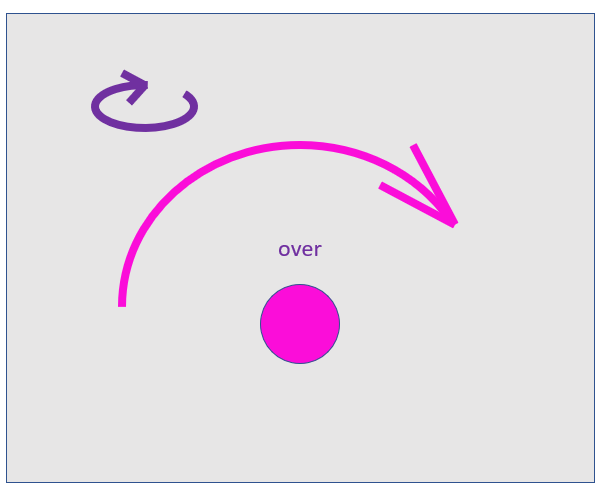In English, you don’t have to learn a lot of complicated words and expressions all the time!
You can learn how to use the power of simple actions that you already know and combine them with little words like “out”, “off,” or “over” for a wide range of expressions!
Let’s start with “OVER”. It means to “move above something”. It is the equivalent of “above”, but with movement and direction, while “above” is static.

Examples:
If you want to go from the US to Brazil, you will need to fly over Canada.
I would like to climb over that wall to see what’s on the other side.
If you understand these basic meanings of “over”, you are now ready to learn different expressions with this powerful word.
HERE ARE THE EXPRESSIONS. CLICK ON THE TRIANGLE TO LEARN MORE ABOUT THEM:
“I can’t believe how much money we spent at the store yesterday. I have the bill in my hands. Let’s go over each item and see if we really need it or if we can return it.” – How else can you say “go over”?
go over = review, reread, check again by discussing something together
His girlfriend left him two years ago, but he still thinks that he’ll never be happy again because she was the only one for him. He just can’t get over this breakup. – How else can you say “get over” something?
get over a bad experience = forget about it, start afresh, liberate yourself from negative feelings
Of course, you know the following expression: “The show’s over“. It means : “we have started at the beginning and now it’s the end.”
Did you know that “start over” exists as well? Look at the example:
“We spent three hours preparting this cake, and it looks and tastes awful. We have to start over.” (We need to go back to the beginning and redo everything.)”
However, the troubles with “over” are NOT over now!
You will discover that “over” can also be placed in front of an action, to make a new word. In this case, the new word will usually mean “an action taken to an extreme or taken too far or taken past the limit”.
Look at the examples, answer the questions and click on the triangles to check if you are right:
“Look at her makeup! I can’t even see her real face under it. I think she really overdid it this time.” – Does it mean that the makeup is good?
No, “overdo” something means do too much or go too far, like an overdose
I came to my friends’ party in a taxi, but my friend Paul had chosen to come by bus and somehow he had overtaken me. – Does it mean that Paul got to the party first?
Yes, “overtake” means go faster than someone else, to move in front of them and to leave them behind
The meeting was supposed to finish at 3 pm but it overran. – Did it finish on time?
No, “overrun” means to last longer than planned, to take too much time
I wanted to come to work early but I overslept. – Was the person late for work?
Yes, “to oversleep” means to sleep longer than what was planned
Have you been able to observe and to memorize what happens when you put “over” in front of or behind an action? Before we finish, let’s look at a couple of actions that can be a little more difficult to remember.
- “overcome an obstacle” – it means to show strength and leave this obstacle behind you
Example: I don’t have enough money to buy a car, but I will overcome this challenge by asking my friends to drive me around all the time.
You can’t say “I will come over this challenge“, it’s incorrect. Why? Who knows. Maybe because “come over” means something different. Look at this example:
“Would you like to come over to my house?”
Can you just say “Would you like to come to my house”? – Yes, of course, but “come over” makes it clear that it’s a real invitation, and that the people want to receive you at their hous, talk and relax and maybe eat something.
“oversee somebody’s work” – to supervise someone to check that they are working correctly. Example:
Teenagers know that when their parents tell them that they will oversee how they are doing their homework means in reality that they will check everything from the beginning to the end.
You can’t see “see over“, it doesn’t exist. Why? Who knows. Maybe to make a couple with “overlook“, which means something totally different, and that is : “not to notice a mistake”. Example:
I was cheking out my favorite websites for a great deal on these new headphones that I wanted to buy, but I overlooked a good offer, and so I missed it.
And to wrap it up (= to finish), let’s look at the word “overnight“, which means “from one day to the next, very suddenly”. Example:
When I woke up the next morning after the party, I regretted having eaten so much. When I looked at myself in the mirror, I had the impression that I had put on five pounds overnight.

Leave a Reply